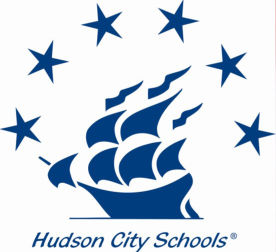District evaluates high school air conditioning overhaul, responds to reading concerns
by Judy Stringer
Feb. 13 school board meeting
Hudson City School Board will soon hear a proposal related to needed HVAC repairs at the high school. Director of Operations Tom Barone told the board he plans to deliver his final recommendation in as soon as two weeks given expected delays in getting new or replacement equipment and the desire to get it done by fall.
“Delivery could take up to 24 weeks based on some production schedules that we’ve had run before, and if you look at 24 weeks from today, you’re probably at the end of July beginning of August, which makes tight timelines for installation,” Barone said.
The main issue is one rooftop air conditioning unit that “is pretty much at its end of life,” he said. That and 10 other rooftop units, expected to last 20 years, have been well maintained but are now about 30 years old, according to the administrator, and have failing parts. They also use a refrigerant, called R22, that is expensive and no longer produced because of environmental concerns.
The main unit in question cools the 2006 high school addition and is in particularly bad shape.
“We have been running on borrowed time with that unit,” he said, “and feel that it definitely does need to be replaced as soon as possible.”
Before its outright replacement, Barone and his team have been evaluating the possibility of installing a central chilled water plant at the high school and moving away from the rooftop system altogether. That would mean replacing the troubled unit’s indoor components with those that are compatible with chilled water technology.
According to Barone, a ground-level chilled water plant would eliminate the need for the R22 refrigerant, allow maintenance staff to keep a closer eye on the HVAC and make it easier for the district to add air conditioning to the building’s gyms and locker rooms, which are not currently air conditioned.
A chilled water plant, he said, is the most efficient way to “best serve our students and to add air conditioning to the only parts of our district without air conditioning.”
Barone cautioned that there may not be much near-term energy savings because the high school is already very efficient, and the new system would be cooling a bigger space with the addition of the gyms. “We definitely feel,” he added, “that the life a chiller plant will definitely outlive the life of the DX-cooling-type systems that we have in place.”
Board President Steve DiMauro asked Barone to include estimates with his recommendation on the “total cost of ownership over the life of the asset” for each of the options, in addition to upfront project costs.
“We really need to look at it through a longer-term lens and make the right choice versus putting a band aid around this,” DiMauro said.
Early literacy concerns
Assistant Superintendent Doreen Osmun addressed recently vocalized concerns about the district’s elementary reading program.
During the public comment portion of the meeting, resident Jennie McGahee linked early literacy “failures” to the use of a program called “Units of Study” by Lucy Calkins at the kindergarten through fifth-grade level. McGahee said, among other claims, that 40% of Hudson first-graders did not meet benchmark literacy levels at the beginning of the school year, that fourth- and fifth-grade teachers at East Woods “are having to reteach simple phonics and writing skills,” and that Calkins’ program is based on theory, not research.
McGahee has also made several social media posts about her concerns, encouraging others to reach out to the board.
Osmun said Calkins’ program is research-based, was chosen in partnership with teachers in 2019 after a year-long pilot and is supplemented with other materials, including “different phonics programs.” COVID-19 and the shutdown, she added, have complicated reading instruction.
Osmun said the portion of first-graders in need of reading intervention is at 24% this year, compared to 16% at the same time last year.
“We typically hover between 12-15%,” she said. “That is something we are definitely keeping an eye on. … But we are nowhere near 40%.”
Her department and teachers are “highly engaged in looking at our phonemic awareness and our phonics assessments,” according to Osmun. Parents worried about their students should talk to their teachers, she said, and/or reach out to her.
In other meeting news, the board accepted the retirement of longtime high school math teacher Alane Malerick and approved a $27,000 contract to hire Experience Management Institute as a strategic plan facilitator. At the Jan. 10 meeting, Superintendent Dana Addis said the strategic plan will be “created through our students, our staff members, our community members, and obviously, our board members” over the next five months. A final plan will be presented in August, according to Addis. ∞

